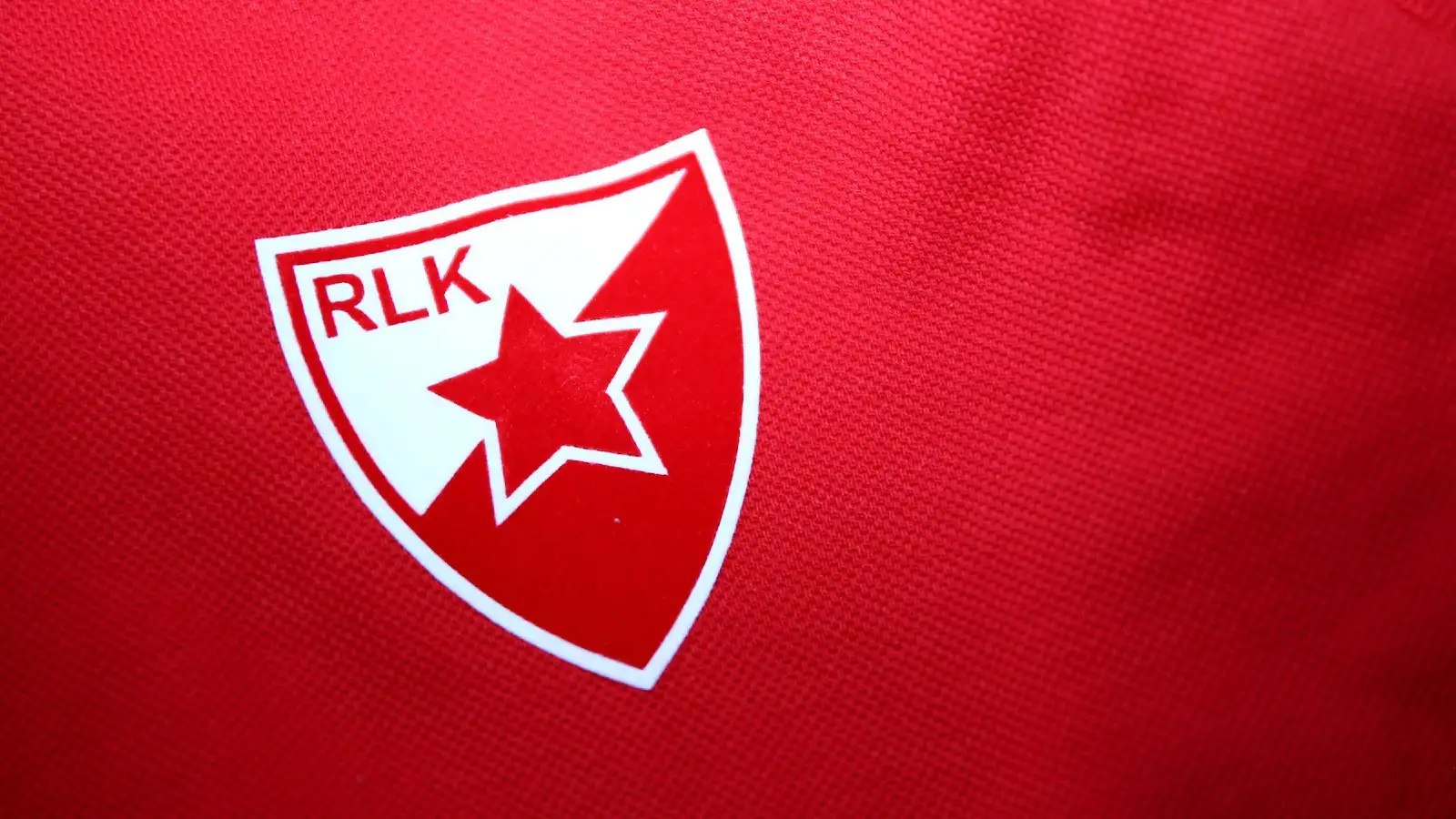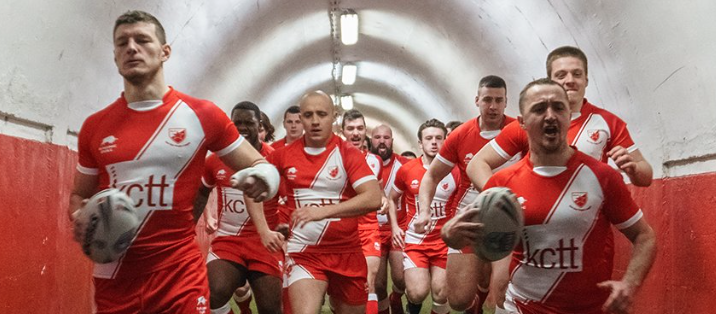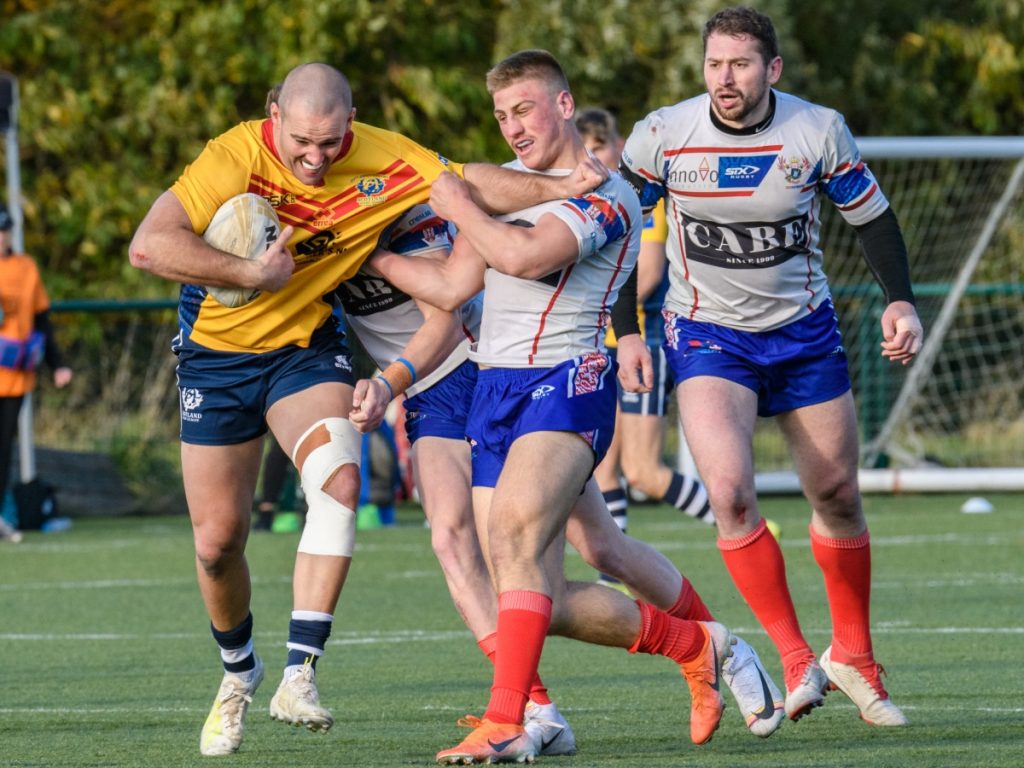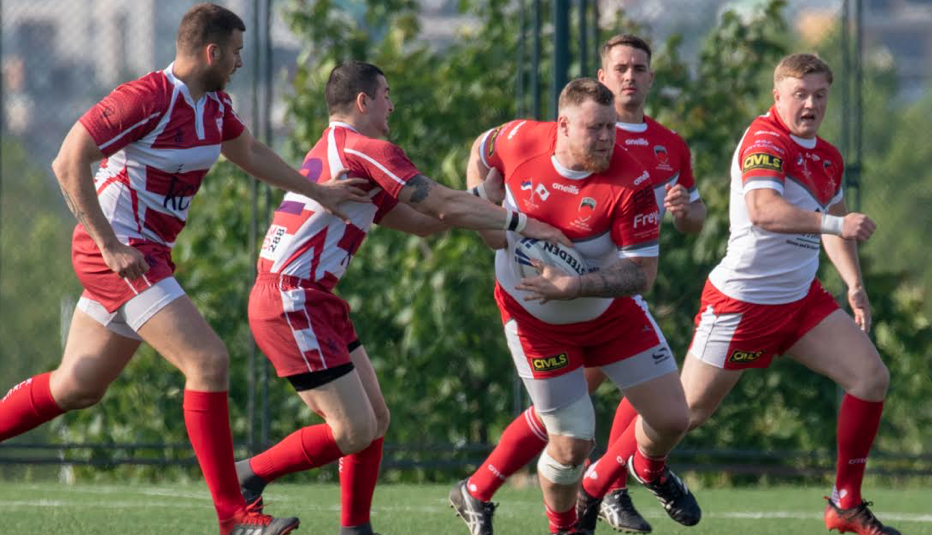Red Star Belgrade want to create blueprint for European club giants to follow

Photo: SWPix.com
Brexit and COVID put paid to any hopes of Red Star Belgrade joining the RFL pyramid, but they still hope to create a model that expands European Rugby League.
Just months before the COVID outbreak, Red Star Belgrade announced ambitious plans to apply to join League 1, even as early as 2021.
They had been buoyed by an encouraging display in the 2019 Challenge Cup, where they faced Cumbrian side Millom live on BBC, going down 38-10.
Red Star had looked to the competition to provide a greater challenge, having breezed through their domestic competition the previous year.
But after COVID turned the world upside down, the tightening of visa restrictions as a result of Brexit has made it near-on impossible for any Serbian players to ply their trade in the professional leagues in Europe in England and France.
The sharp rise in costs in all industries following COVID has also contributed to focusing inward on growing the domestic Serbian competition, a strategy which may result in bigger long-term success.
 Red Star Belgrade with the Challenge Cup trophy following their historic clash with Millom. Picture by Ash Allen/SWpix.com
Red Star Belgrade with the Challenge Cup trophy following their historic clash with Millom. Picture by Ash Allen/SWpix.com
Growing their own competition
Australian Colin Kleyweg is the managing director at Red Star Belgrade. He splits his time between Australia and Serbia, where he has business interests. Kleyweg helped to found the Serbian Rugby League federation in 2014 and had a hand in bringing Brian Smith and Matty Bowen to the Balkan state to help raise awareness of the sport.
“I got involved through a love for rugby league and when I met the two people in charge of Red Star, I had a look at what they were doing and I felt like it was a decent group of people, but felt that the players needed to push themselves to the level they could get to. We agreed to get involved, watched the team for a year, sat down and said ‘if you guys want me to fund this, that’s not a problem, but this is what needs to happen.
“We’ve got to grow our own competition. I don’t see it (playing in RFL competition or in French Elite system) happening. There are massive risks – politically, geographical tensions, monetary tensions, anything budget or inflation related is difficult to predict. It’s such a difficult time. The world is becoming narrower than it was.
“The Challenge Cup is too difficult from a logistics point of view. The draw is only in January and then the game a few weeks later. It doesn’t give much time to sort out accommodation, flights and visas. But they shouldn’t have to change the competition for us. It was hard work when we went over, and the way the world has changed since, there’s not a chance we could do it now.
“We can’t logistically put Red Star in the UK without having a multi-millionaire or billionaire.
“It’s time now to focus inward, keep it going and see where we end up.”
 Photo belongs to Red Star Belgrade Rugby League Club
Photo belongs to Red Star Belgrade Rugby League Club
Frustration on the international stage
Outside of the UK and France, Serbia is now comfortably the strongest rugby league nation in terms of participants.
According to the 2021 European Rugby League Annual Report, Serbia boasted 703 registered participants, which is around double Scotland (369) and Ireland (420). It’s comfortably higher too than two other participants at last year’s World Cup, Italy (60) and Greece (190).
There is frustration that Serbia were not able to build on their domestic growth by participating on the world stage, particularly given the presence of nations almost completely reliant on heritage players.
They will get the chance to put that right this autumn when they take part in the European Championship, though they will still be outsiders to qualify for the 2025 World Cup in France. Serbia themselves have branded Group A, which includes England, Ireland and Scotland, as the “Group of Death”.
There’s an element of frustration that other countries are championed for their efforts, when they’re playing so-called international matches almost exclusively in Australia.
That’s a stark contrast to Serbia, who are running an eight-team domestic competition, with Red Star likely to play as many as 23 games in a year.
“They say we got 2.5k (for an international match) in Sydney – great, they’ve got one Macedonian, not one Maltese person, the press don’t care over there. They’re playing internationals in Perth and we’re like ‘great, we’re playing 20 games here in Serbia.’
 Serbia in action against Scotland in 2019
Serbia in action against Scotland in 2019
“It may create a trickle down effect that is better than nothing, but as far as being internationalisation of the game, it does more harm than it does good. If you talk to guys in Greece, they were very proud they got in to the World Cup – but they had to fight very hard to get Greek players in to that team.
“A team of domestic Serbian players against the same from Wales would be a decent game. There’s not another country I’d be fearful of. When we play with the European Rugby League rules around quota players, we beat Italy and Greece; but then in World Cup qualifying when the rules are different, Greece have 16 Australians and one Greek player and they beat us by 82 points.
“The (Serbian) players were dirty about that. And I see it all of the time. It’s like you’re defeated before you get there.
“There needs to be a serious discussion about European rugby league and international rugby league and if they are serious about supporting it. How would they feel if Serbian rugby league died and people like us walked away? Countries need to be given the tools to grow the game.”
Although lockdown created greater interest in the French Elite Championship, there remains very little exposure in domestic rugby league outside of the UK.
Red Star Belgrade and fierce city rivals Partizan play in an eight-team Serbian rugby league competition, while they are also turning out in the 12-team Balkan Super League, which features teams from six different countries.
The two Belgrade clubs dominate the honours list in recent seasons, with Partizan having stepped up their game to keep competing with Red Star.
 Partizan Belgrade team ahead of the 2023 Balkan Super League season
Partizan Belgrade team ahead of the 2023 Balkan Super League season
Could the multi-sports club model unlock rugby league’s European potential?
The Red Star sports society, also known as SD Crvenz zvezda, dates back to 1945. It has 36 clubs in 31 different sports, with rugby league joining the family in 2006.
That includes the football club, who won the European Cup (now the Champions League) in 1991 and play at the 53,000-capacity Rajko Mitic Stadium.
Multi-sports clubs are commonplace in mainland Europe. Barcelona and Real Madrid, for example, have high profile teams in basketball, amongst others. Basketball boasts plenty of other recognisable European names too, including CSKA Moscow, Panathinaikos and Fenerbache. The European handball league features teams like Benfica and Sporting CP.
“It’s not my job to support the whole league and competition. I’ve shown the business plan of what a club can look like, it’s important that we have support.
“The Red Star sporting society has become really supportive. We won the club’s 750th trophy. There’s a lot of latent interest in something if we can get rugby league as a sport to help. We actually have the bones of something beautiful. Surely the sport should look at this and think it could actually be interesting a breeding ground for future players for Super League.
“It could be the start of a European club competition. You try this out for three to five years on very affordable monthly retainers for training, we dabbled in broadcasting. You need the infrastructure from day one.
“I put a document together for a European Club competition and my whole goal was to associate teams to European giants like Red Star. We were in the Challenge Cup for one season and the BBC were all over it, they were very interested in us.
“Could you imagine what it would be like you had Bayern Munich v Red Star? Or Barcelona v Galatasaray? There are plenty more examples of multi-sport clubs like that.
“Start an eight-team competition, maybe pick up two French city names like Marseille and Lyon, and then you have all this goodwill and infrastructure straight off the bat.
“Of course, Red Star football fans aren’t all going to come and watch rugby league the moment it comes on, but if Red Star win they will congratulate us. At the moment, they see it as a curious oddity. But if we were in a proper competition with big names, we do see it increasing for us.”
Bridging the gap to the professional leagues
That may sound like a pipe dream, but in the meantime, Kleyweg is sure he knows what Serbian rugby league needs to move forward – more professionalism.
It’s that approach, which has included paying players to train and play, that has started to drive improved standards.
In recent years, Serbian clubs have been able to take on some opposition from the UK – with Lancashire Lionhearts touring Serbia in 2019 to take on Red Star Belgrade and a Serbia Select side.
 Photo courtesy of Mark Stringer
Photo courtesy of Mark Stringer
As with many expansion outposts, the problem is first finding someone to play, and then finding a way of playing others at a higher level.
Kleyweg added: “The players have the ability. We talk a lot about attitude. There was a really good interview with (then York coach) James Ford after they set the world record for a win. He said that when you are playing a team like that, you forget about the team you’re playing. They didn’t have to climb mountains to score, but it was about the amount of concentration the players have.
“Whereas we would see our team going 24 points ahead in 15 minutes and then easing off and all of a sudden it’s 24-20. We said if you ever played like that against an English/Australian team, they would wipe the floor with you. We sat down with the players and spoke about it, next game they put it in to practice and we won 124-0. They proved they could do it.
“You need to be brave. It’s all about being fit and conditioned and being able to play at that pace and for how long. You look at your team and think how quickly can you get X players to that level, and then it becomes about mentality. When you were only playing in the Serbian championship, you could do 20 minutes at 99% and then pull back; if you’re playing in League 1 or Championship, you can’t do that. So it’s making the boys understand the fitness required and get them to that level.
“They know how to tackle, how to pass, how to break tackles. The problem is when they under fatigue, the human mind starts making them make mistakes. The only way you can improve is by understanding the psychology behind the way the game is played.
“If you’re going to take on a team from outside a heartlands area, then rugby league is the most attritional sport in the world, certainly in terms of physicality. If you put a bunch of players who’ve played for years up against a few guys who have just taken up the sport in Europe, you’re going to see mayhem.
“The way forward for Serbia is to have two or four semi-professional clubs. That can happen very easily, if there’s a little bit of money to pay and train. If Serbia is to bridge the gap, the game of rugby league needs to ask what it wants to happen internationally. Does it want to reward Serbia for building up a semi-professional competition?
“We feel we’ve created a model to grow. In six full seasons, we’ve won 15 trophies. There’s not much more we can do. We now need to go and expand it (the comp), and that’s the attitude we’re going to have.”


